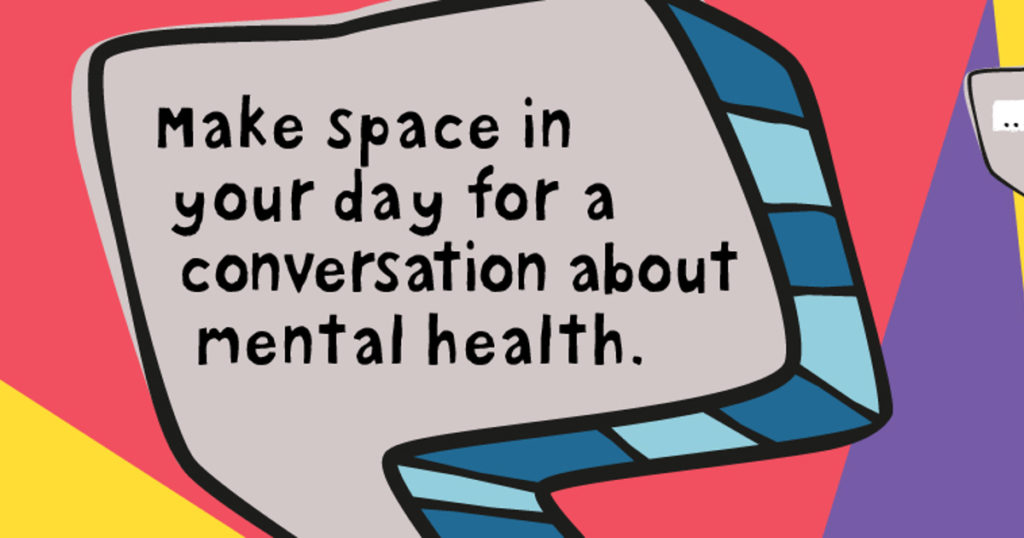There are moments in life when silence can feel heavy. When words are stuck, and our feelings stay buried. But what if breaking that silence, having one conversation at the time could save a life?
By My Side Support has seen the impact that meaningful conversations can have on our mental health. Sometimes, the simple act of speaking up and sharing what’s on our mind is the first step towards healing. Yet, for many people, starting that conversation is the hardest part.
In this article, we address why breaking the silence is so important and how it can make all the difference.

The Weight of Silence
When we are struggling with our mental health, silence can be both comforting and suffocating. We’re reluctant to speak up; because we fear judgment, vulnerability, and being a burden on family and friends. It’s even easier to say “I’m fine” to our loved ones, when everything inside feels anything but fine. Holding in our pain often leads to more isolation, and the weight of silence becomes unbearable, sometimes leading to suicide.
We need to remind ourselves and those around us that it’s okay not to be okay. Mental health struggles are not something to be ashamed of or to hide. The silence surrounding our deepest emotions can sometimes be the most dangerous.
Why Breaking the Silence Matters
Having conversations about mental health can be life-changing and, in some cases, life-saving indeed. When we break the silence, we create space for understanding, support, and healing. Opening up, whether it’s to a close friend, family member, or even a mental health professional, can be the first step towards our recovery.
Here’s why breaking the silence matters
It reduces isolation: Speaking out about our feelings helps us realize we’re not alone. It allows others to offer support and share similar experiences, helping us feel more connected to the world around us.
It encourages early intervention: Having early conversations about mental health can prompt individuals to seek help before things get worse. Early intervention can prevent crises from getting out of hand and provide the tools needed to cope.
It destigmatizes mental health: Every time any of us breaks the silence, it rids a bit of the stigma surrounding mental health. Open discussions nurture a culture of empathy, acceptance, and understanding.
It opens doors to support: Breaking the silence can lead to opportunities for treatment, support groups, or just a compassionate ear. It shows that help is available, and that asking for it is not a sign of weakness.
Case in point; the Conversation that Saved Wilson’s Life
Wilson had been silently struggling with depression for years. On the outside, he appeared to be doing fine. He had a steady job, friends, and a supportive family, but internally, he felt trapped and hopeless. His mental health was shrinking, and he started having thoughts of ending his life.
One evening his girlfriend, Christy, noticed that he had been unusually quiet and withdrawn. She went to him asking, “Are you really okay? You haven’t been like yourself lately.” At first, Wilson brushed it off as usual, insisting everything was fine. But Christy wouldn’t take that this time. “I’m here for you, and you can talk to me about anything. No judgment, I promise.”
For the first time in years, Wilson allowed himself to open up, to be vulnerable. He shared his feelings of despair. It was related to his work. Christy resisted the urge to offer a quick solution and instead, focused on truly listening. They later reached out to a therapist and set up an appointment.
That one conversation changed Wilson’s life. It was the beginning of his healing journey, and it may never have happened if Christy hadn’t asked that one simple question, “are you really okay”.
Sometimes, all it takes is one person willing to listen, and another willing to break the silence, to open up.

How you can start the Conversation
Whether you’re the one struggling or someone in your life is, here are some ways to begin those life saving conversations.
Regular Check-Ins: Genuinely ask how people are really doing, especially if you notice changes in their behavior. A genuine “How are you, really?” can open the door to an honest conversation. You can even have these check-ins via your social media status and updates.
Listen without Judgment: Let the person talk without interrupting, without offering solutions or making them feel like it was their fault. Sometimes, they just need to feel heard.
Be Vulnerable: If you feel comfortable, share your own experiences with mental health, your lows and highs.. This can encourage others to open up and feel less alone in their struggles.
Offer Support: If someone opens up to you, offer help (not solutions), whether that’s finding a therapist, accompanying them to a support group, or just keeping them as a friend. If you’re also unable to hold it in, speak to a professional as soon as possible.
Normalize Conversations about mental health: Make talking about mental health a regular part of your life. The more we normalize these conversations, the easier it becomes for us to speak up.
Breaking the silence around mental health is one of the most powerful things we can do. It does not only help us to find healing for ourselves, but it also encourages others to seek the support they need. Conversations about mental health can save lives, not just one. AS in the case of Wilson; and all of us have the capacity to be part of such life-changing conversations.
If you or someone you know is struggling, please don’t hesitate to reach out. We are here to listen, without judgment, and to remind you that help is always within reach.
Sometimes, all it takes is one question, one moment of vulnerability, and one conversation, to save one life.
Image Credit: PulseToday
Author: Abyna Mandy